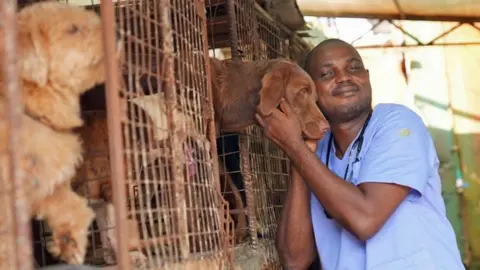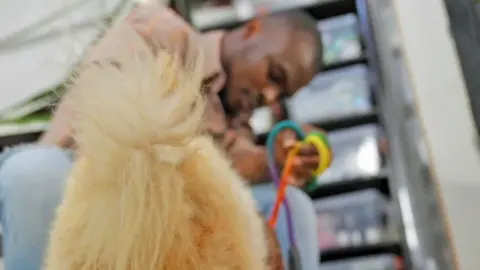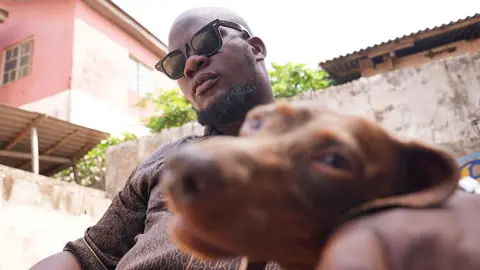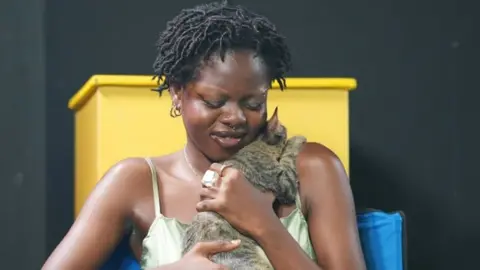Heartbreak as cash-strapped Nigerians abandon their pets
 Kelechi Anozia / BBC
Kelechi Anozia / BBCPreye Maxwell looks distressed as he leaves his beloved dog Hanks at an animal shelter in Lagos, Nigeria's commercial hub.
Fighting back tears, he says: "I can't afford to take care of him. I can't afford to feed him the way he should be fed."
His two-year old American Eskimo barks as his owner turns his back and walks out of the St Mark's Animal Rescue Foundation in the Lagos suburb of Ajah.
Dr Mark Afua, a vet and chairman of the rescue centre, takes Hanks and puts him in a big metal cage - one of many in the single-storey building designed for dogs, cats, snakes and other animals.
Hanks wheels around in circles in his cage - and Dr Afua tries to calm the distressed fluffy-haired dog.
Mr Maxwell, an online media strategist, was recently made redundant. His job-hunting means he is never at home and so feels unable to look after Hanks.
"I'm trying to get whatever I have to do to survive. I don't even have the time now [to look after Hanks] because I'm always out looking for jobs," he told the BBC.
 Kelechi Anozia / BBC
Kelechi Anozia / BBCThe 33-year-old's decision was difficult to make, but it is one that many pet owners are taking in the face of the rising cost of living in Nigeria.
Africa's most-populous nation has been hit by high inflation since President Bola Tinubu came to power two years ago and removed a long-standing fuel subsidy.
The inflation rate surged from 22% in May 2023 to 35% in December 2024, a 28-year high, according to the National Bureau of Statistics (NBS.)
Inflation has since fallen back to 24% but this means that prices are still continuing to rise, just not as quickly as before.
The economic crunch has meant that some companies have had to downsize to keep afloat in the face of rising operating costs, pushing young people like Mr Maxwell into an already saturated labour market.
Animal rights activists and animal shelters say that they are seeing an unprecedented numbers of abandoned animals as the cost of looking after pets spirals out of control.
Prices for pet food and veterinary care have jumped by more 100% as some things, especially medication, are imported - and the local currency has plummeted against the dollar.
"About 10 years ago when we started this project, we really didn't have people giving up their dogs because they were unable to feed the dogs," Dr Afua told the BBC.
"Right now, we have 10, 12 animals being dropped in a month."
Some, like Mr Maxwell, hand their pets over to a shelter for adoption but others simply abandon their animals.
Animal cruelty campaigner Jackie Idimogu, who is president of My Dog and I - a dog-lovers' community in Lagos who often helps to rehome pets, says she has noticed the change.
"Now they don't even have that patience [to find new owners]. They just tie the dog out to a post on the road or they just unleash it on the road," she told the BBC.
The 32-year-old says more that 50% of her income as a furniture maker and interior designer now goes on looking after her four dogs.
"I'm spending roughly 250,000 naira ($158; £117) every month on pets," she says, adding that this includes someone to walk the dogs and look after them when she was not around.
But Ms Idimogu says she cannot bear to give them up.
"As a single lady, I have no kids of my own yet. My dogs are my babies. I don't see any difference between myself as a dog mum and a human mum. I don't think I have it in me to give up any of my babies for any reason whatsoever."
Instead, she has chosen to adapt her lifestyle - fewer luxuries for herself like jewellery, expensive hair styles and spa visits and fewer treats for her pets like chicken, yoghurt treats and car rides.
"I used to be flashy, but now I had to tone down because of my dogs."
 Kelechi Anozia / BBC
Kelechi Anozia / BBCThe same goes for Amartya Odanokende, who goes by the name "Jason the Cat Guy" on social media, where he likes to impart his love of felines to his fellow Nigerians who often regard cats with suspicion because of their association with witchcraft.
He spends approximately $160 a month on food for five big cats and some kittens, plus another $7 on 10kg of cat litter. Since he got his Prussian cats in 2020 he says what he spends has gone up 100%.
Such "skyrocketing maintenance cost" is a concern and he worries about getting into debt.
Lagos sales executive Iyke Elueze is also struggling to look after her 10 dogs.
"There's a particular brand of food I used to use. It was just about 30,000 naira then. That same brand of dog food is 165,000 naira," he told the BBC.
He credits his first dog Hennessey with saving his life at a time he was struggling with depression - nonetheless he would like to get rid of some of his animals as he now needs to prioritise his toddlers.
But the 36-year-old fears that his dogs could end up being eaten - as they are considered a delicacy in some parts of southern Nigeria.
Celebrity chef and Guinness record breaker Hilda Baci once came under fire on social media after she admitted making a dog-meat themed menu.
"I am very careful with who adopts my dogs. I don't want my dogs ending up in any other person's pots," said the father-of-two.
 Kelechi Anozia / BBC
Kelechi Anozia / BBCMistura Ibrahim, a young tattoo artist in Lagos who has made it her mission to help cats after saving two who were about to be stoned, is depressed about the situation and is finding it hard to find new homes for others she continues to rescue.
"I get some calls from people that I've given cats to in the past and they say that they really cannot afford to keep the cats."
She no longer feeds her cats tinned meals, opting to give them food from her own plate.
Her advice is to take pet welfare seriously: "It's just like having a child. If you can't afford to have a child, then don't bring a child to the world."
For Dr Afua, who uses the profit from his veterinary practice to fund his shelter, it is getting harder to house the unwanted animals.
"We try to help the animals get homes quickly but I'm careful [about] the homes they go to so they don't come back. And some animals will never find homes because of previous abuse."
With St Mark's Animal Rescue Foundation caring for more than 60 dogs at the moment - around twice its capacity - would he ever turn away an animal?
"I don't have the heart to. As I speak I have dogs and cats everywhere. My office and home is full - and I still make room for the next."
More Nigeria stories from the BBC:
 Getty Images/BBC
Getty Images/BBCGo to BBCAfrica.com for more news from the African continent.
Follow us on Twitter @BBCAfrica, on Facebook at BBC Africa or on Instagram at bbcafrica
